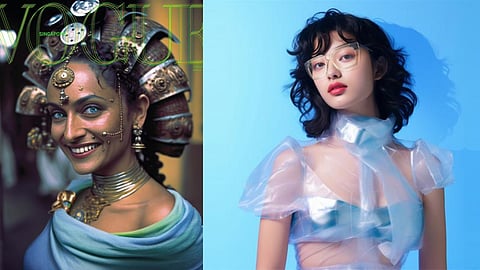
- HOMEGROWN WORLD
- #HGCREATORS
- #HGEXPLORE
- #HGVOICES
- #HGSHOP
- CAREERS
- ABOUT US
- CONTACT US

It is now almost 30 years since Aishwarya Rai Bachchan hefted the Miss World tiara, espousing compassion and the ability to “look beyond the barriers that man has set up for ourselves of nationality, colour” — ideals she believed would not only make a true Miss World but also a ‘real person’. Lil Miquela, a 19-year-old influencer from L.A., posed next to the Arc De Triomf in Barcelona almost a week ago. Her Instagram account has garnered close to 2.7 million followers and her bio gives a spirited nod to ‘Black Lives Matter’. The selfie she posted was appended with a sublime caption: “I wonder if I’ll be around as long as this monument.” The chilling irony is that she will probably outlast the archway.
While her real world values and political leanings are pleasantly relevant to the zeitgeist, the problem is that Miquela is only a mouthpiece for her creators, Trevor McFedries and Sara DeCou who manufactured her identity as a promotional tool for streetwear or luxury brands like Calvin Klein.
In the content marketing multiverse, where recurring trends have always been vulnerable to saturation thresholds and scrolling fatigue, the hyperrealism of CGI influencers and A.I. powered models did not have to hustle too hard to steal the show. Bengaluru-based startup Bigthinx erupted on the scene around the pandemic, as immersive runways and digital avatars were revolutionising how we engage with style, the founders Shivang Desai and Chandralika Hazarika posed confidently at the frontline of contactless retail shopping in India.
Couture houses around the world have started experimenting with 3-D personalised versions of their consumers to resolve the high number of returns logged by their e-commerce platforms — the clothes that don’t fit right or look good end up in landfills and incinerators — paving the way for what they believe embodies genuine inclusivity.
While the automated fitting rooms might be a blessing for brands trying to mitigate costs on free returns and also in the long run, prove better for the environment, a backwash of idealised representation is already beginning to submerge these digital stand-ins. The Chinese tech giant Alibaba, being a case in point, unpacked a free model simulator named Taji on its e-commerce portal all the way back in 2020. The tool lets vendors choose from 100 mannequins of different ages and racial backgrounds but most of them are either white models with blue eyes and blond hair or Asian ones with wide eyes and a lean figure. Eerily lifelike simulations clad in lingerie have begun to pop up all over the internet, some having their likeness stolen from real women, perpetuating the male gaze and systemic biases in photorealistic A.I. generated content. Needless to say, this manner of objectification is contributing to the recent surge in body image issues and eating disorders among young girls exposed to stereotypical imagery on social media that promote unrealistic beauty standards.
As the K-pop bandwagon has been trundling through the echo chambers of Indian digital landscape, homegrown eyewear label Lenskart has hitched a ride with the band Astro IRIS developed entirely through artificial intelligence, in their first customer-facing campaign of this nature to capitalise on a hugely successful subculture. Initially dipping their toes in generative A.I. softwares like Runway and Stable Diffusion, but settling finally on Midjourney, the curated look was inspired from the chromatic glamour of South Korean band Aespa's music videos among others. Brands can now easily customise AI models to suit their target audience, tapping into unlimited creative control, and effectively eliminating cumbersome artist contracts or exorbitant product shoots.
The airbrushed faces with their unblemished skin — achieved through the wonders of technology and image manipulation — are furthering the cause of cosmetic surgery on all the flaws that make us human.
Featured on the cover of the March issue of Vogue Singapore this year, a bevy of cybernetic-enhanced Southeast Asian women like Aadhya were bedecked in Ferragamo’s spring collection, and each of these models had been designed using the aforementioned AI programs (chiefly Midjourney and Dall-E). Varun Gupta, a Mumbai-based filmmaker and creative director of boutique content house We Create Films, is the AI artist for this futuristic ‘Roots’ edition. Striving to push the boundaries “beyond what’s possible,” the narrative focus of this campaign is on preserving ethnic lineage through the lens of an ‘altiverse’ where fashion dwells on the intersection of tech and creativity.
Such cross currents of digital diversity have often been held up as evidence that international brands are finally investing in representing marginalised communities like when Levi’s partnered with the digital model studio Lalaland.ai to generate a whole coterie of models of colour. Transparently a gesture of deeply troubling tokenism, this was seen as a ‘lazy’ and ‘problematic’ marketing gimmick that appropriated the stories and livelihood of real artists from the BIPOC community.
Though digital models like Nila and apparel brands like Good Indian or LOTA are early harbingers of India’s A.I. revolution, fashion influencers and photographers in our country are still convinced that nothing can replace the human touch, not even models made of codes and algorithms. This year, Lil Miquela became the first CGI influencer to sign with prestigious talent agency CAA, and is prophesied to earn more than 10 million dollars. Someone who doesn’t even exist will be raking in more than a model who would have to change over 50 outfits in a day for an average e-commerce photoshoot. But I am willing to bet anything that Miquela doesn’t have to deal with the trauma of hate speech in her comments section.
